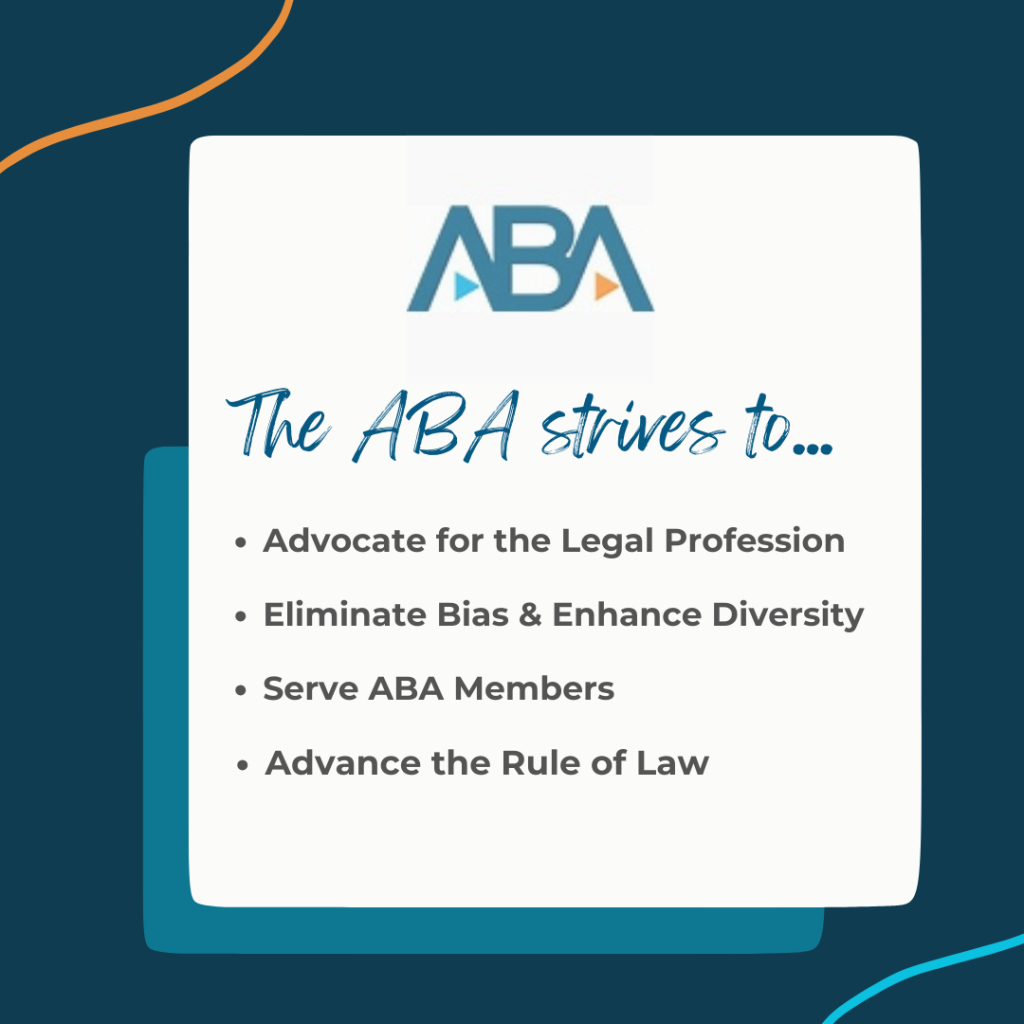In April, the American Bar Association (ABA) President, Mary Smith, will visit campus. This is an exciting and unique opportunity for students, faculty, and staff to connect with a national leader in the legal profession. In honor of Ms. Smith’s visit let’s take some time to learn more about the American Bar Association and why it is important to the U.S. legal system and the legal profession!
To learn more about unique opportunities for pre-law students to engage with Ms. Smith during her visit, click here!
What is the ABA?

At its core, the ABA aims to guide the legal profession in the U.S. and provides resources to support and assist law students, lawyers, and judges across the country. The ABA also helps ensure standards of legal education in the U.S. by overseeing the accreditation of U.S. law schools and making important decisions on policies regarding law admissions standards. Finally the ABA works to improve the legal system for the public through research and advocacy work. The ABA was founded in 1878 by 75 male lawyers from 20 states. In 1918, the ABA admitted its first women members – Judge Mary Belle Grossman and Mary Florence Lathrop. In 1923, the ABA was recognized by the US Department of Education as a “professional accrediting agency for law schools in the US” and continues this responsibility to this day.
How does the ABA work with attorneys?
The ABA is a voluntary bar association of lawyers and law students who can join the organization regardless of what state they practice or live in. The ABA works to create multiple professional opportunities for its members such as ABA Working Groups, conferences and meetings, articles and resources, and awards and fellowships to promote recognition. Below is a highlight of some of these ABA sponsored programs and resources.
ABA Working Groups: There are currently 39 ABA Working Groups focused on a wide-range of legal specialty areas ranging from Family Law to Air & Space Law to to Government & Public Sector to Estate Law to Construction Law to Business Law and beyond. Working groups also aim to support attorneys at various stages of their careers supporting groups for law students to senior attorneys. Working Groups may host recurring meetings, conferences, and networking opportunities, share resources on hot topics and emerging issues, and serve as a source of referrals and information for its members.
Events, Conferences, and Meetings: The ABA has a robust calendar of events showcasing CLEs, working group conferences, subject-matter institutes, series, annual conferences, and more! To view the calendar, click here.
Articles & Resources: The ABA strives to provide relevant and trustworthy resources which help educate members on the emerging changes and trends across the legal landscape, some are exclusive to its members and some are open to the public. For example, the ABA speaks to the state of the legal profession, providing insights and updates relevant to the public. Additionally, the ABA may provide judicial ratings on significant judicial appointments and provides opinions of judicial efficacy to help inform the public during crucial election periods. Finally, the ABA publishes professional journals and magazines for members to provide updates on the changes within the profession, recognize the work of members of the legal profession, and to help keep members of the legal professor apprised of changes and developments within the law. To explore these resources, click here.
How does the ABA work with law students?
The ABA is charged with overseeing legal education. Through the Office of the Managing Director of Accreditation and Legal Education, the ABA manages the law school accreditation process, oversees the collection of law school data (published each year in the 509 Reports), provides interpretive guidance as needed, and more. Most US states require that students graduate from an ABA-accredited law school to sit for the bar and become a licensed attorney in that jurisdiction. The ABA visits and audits accredited law schools every seven years to ensure they are in compliance. All law students may join the ABA for free! Through membership law students enjoy a diverse list of benefits including networking, attending conference, and professional internships.
Additionally, the ABA provides important resources for pre-law students on things such as selecting a law school, financing law school, core skills, values, knowledge and experience, and more.
The ABA is also a source of undergraduate and legal internship opportunities. Here are some examples of undergraduate internships:
- Civil Rights and Social Justice Internship
- ABA Commission on Disability Rights Internship
- Death Penalty Representation Project Internship
Here are some additional resources for students:
- ABA Statement on Law School Rankings
- Enrollment Information
- Bar Passage Statistics
- Employment Statistics

